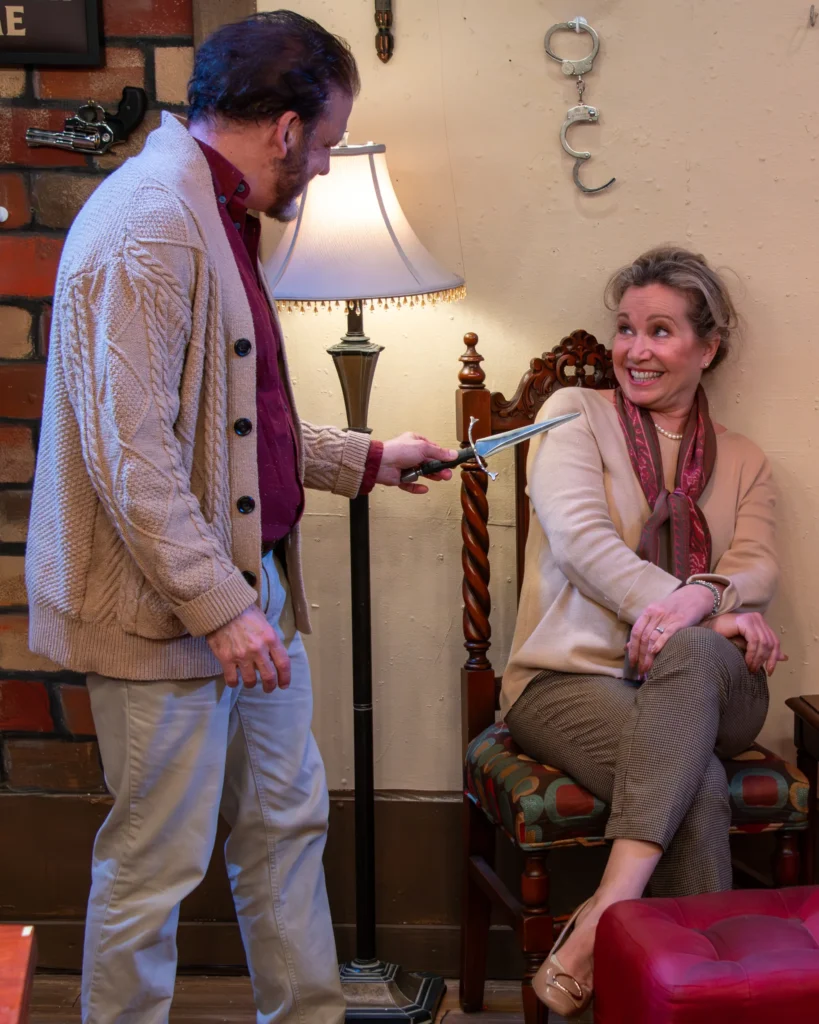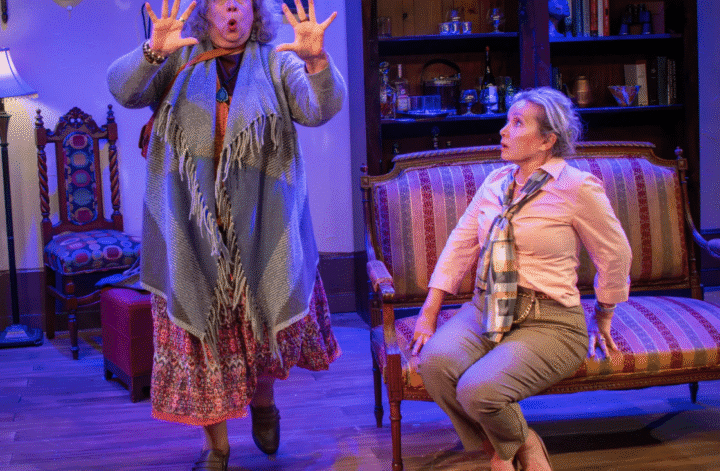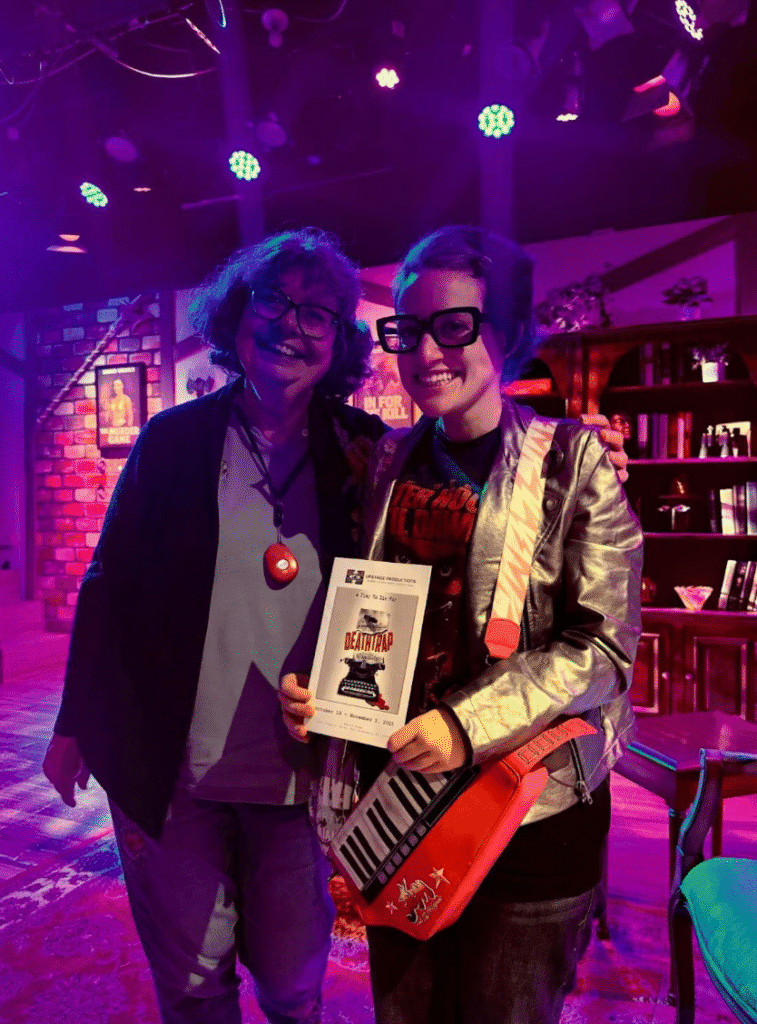Would you kill for a hit? With my mom, South Florida Theater’s own wonderful Mindy Leaf
Does art imitate life, or does life imitate art? That eternal question slinks across the boards in Deathtrap, Ira Levin’s devilishly clever thriller now playing at Empire Stage courtesy of exciting new theatre company on the block, Upstage Productions. Directed by DK Kondelik, this new staging takes the classic four-Tony nominated 1978 play—a wicked satire of ambition, authorship, and ego—and gives it fresh voltage, its twists snapping like trapdoors underfoot. What begins as a witty drawing-room mystery unfurls into a gleeful study of human deceit, Clue meets hall-of-mirrors fever dream.
The play opens in the Connecticut study of once-renowned playwright Sidney Bruhl, a man whose glory days as a hitmaker of Broadway thrillers are long behind him. Surrounded by relics of past success—swords, handcuffs, pistols, and playbills with titles like The Murder Game and Gunpoint—Sidney sits in quiet desperation. Then, a mystery package arrives: a manuscript titled Deathtrap written by a former student, Clifford Anderson. It’s flawless. Too flawless. The kind of script that could revive Sidney’s career—or end his moral life.
Larry Buzzeo steps into Sidney’s shoes with sly control. His Bruhl is a charmer, a cynic, a serpent who sheds skins as easily as changing ties. Buzzeo plays Sidney not as a villain but as a man intoxicated by his own decline. One minute he’s the genial mentor, the next a calculating predator polishing his next great plot twist. You can almost see the gears turning, the artist at war with the murderer, the playwright who can’t resist staging one last masterpiece—this time with real blood. Buzzeo commands the role with an elastic mix of humor and menace, his performance both precise and uncomfortably human.
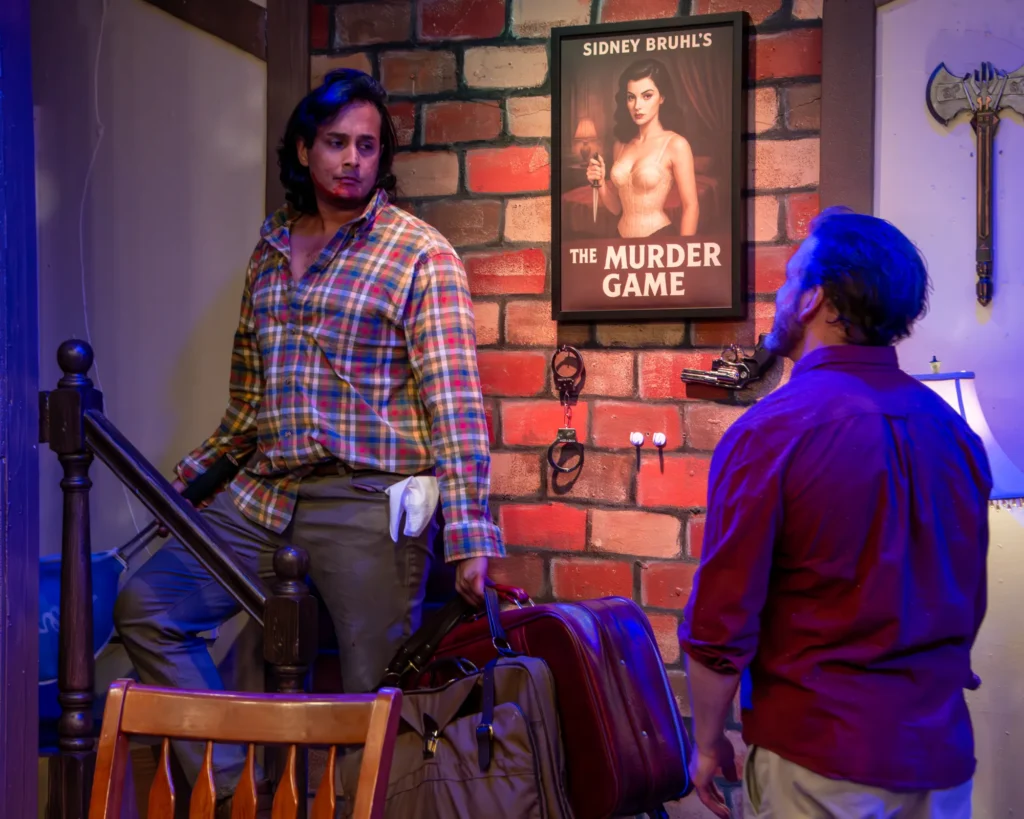
Opposite him, Om Jae brings a mesmerizing blend of charm and danger to Clifford Anderson. At first, Clifford seems like the eager young writer, all gratitude and bright-eyed enthusiasm, humbled to be mentored by his idol. But Jae plays the part with subtle mischief, letting the cracks form slowly until we’re no longer sure who’s teaching whom. As the tension thickens, Clifford’s smile becomes a mask, his admiration a provocation. Jae captures the script’s most delicious irony—that Deathtrap itself becomes the deathtrap, the written work that consumes its creators. He handles the physicality and pacing of the role with sharp, feline precision; his energy ricochets beautifully against Buzzeo’s measured restraint. (Jae also served as the play’s Fight Director. Certified in all weapons and firearms training, his skills were often on display.)
As Myra Bruhl, Sidney’s long-suffering wife, Michele Verdi provides the emotional balance of the piece. Myra is the voice of reason, the worried heart trying to steady a husband unraveling beneath his own ambition. Verdi’s interpretation is tender yet knowing; she understands that Myra’s compassion is both her virtue and her undoing. Her expressive face speaks volumes—each wince, hesitation, or darting glance betrays the unease of a woman living with a man whose mind is a labyrinth. When Myra’s fears begin to materialize, Verdi grounds the play’s mounting absurdity in raw emotion. Her performance gives the audience a momentary foothold of sincerity amid the swirling deceit. Yet, at times we wonder, if she’s not letting on more than we might have initially believed…
Enter Betsy Bittar as Helga Ten Dorp, the Bruhls’ flamboyant psychic neighbor who storms the play like a gust of supernatural mischief. Bittar’s Helga is a walking exclamation mark, equal parts comic relief and clairvoyant chorus, shaking the air with eccentric prophecies. Her German accent and outlandish energy inject bursts of farce into the tense rhythm, and yet beneath the laughter, there’s something unnervingly true about her intuition. She knows too much. She senses the ghost of guilt long before the body hits the floor. Bittar’s timing is exquisite—her every entrance disrupts; her every exit leaves a shiver.
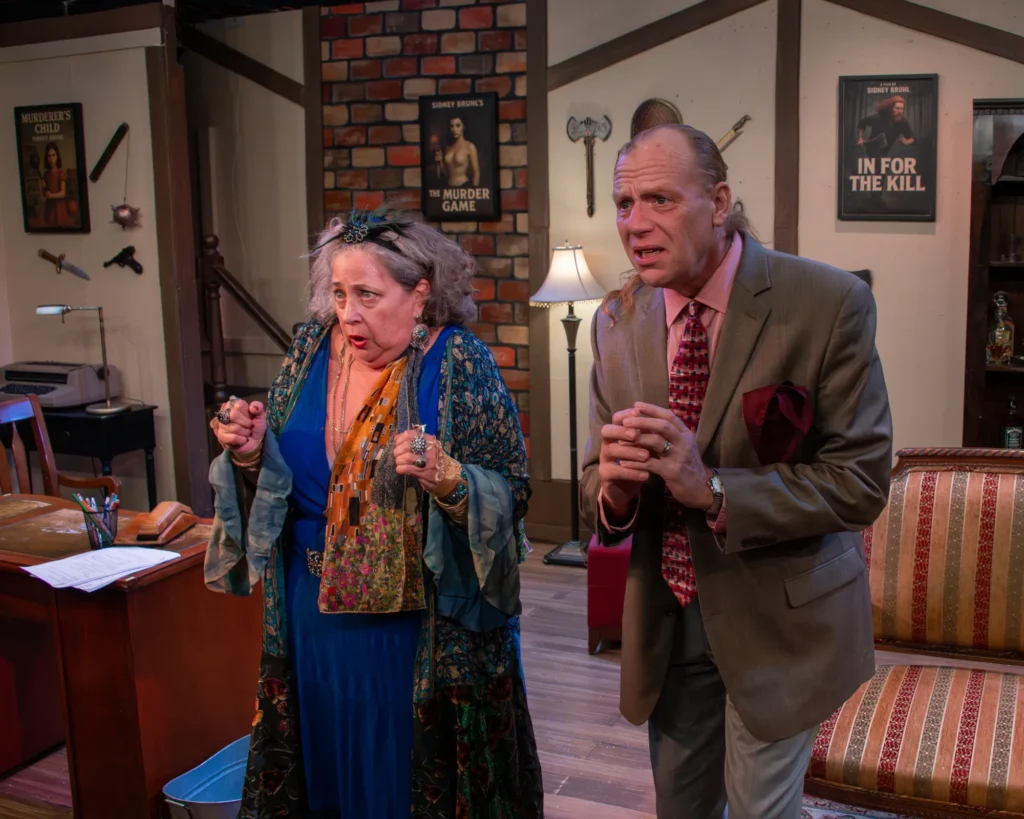
Rounding out the cast is Matthew Pyle as Porter Milgrim, Sidney’s unflappable attorney. Though the role may appear peripheral, Pyle’s calm, grounded presence lends the production a quiet realism. His crisp exchanges remind us that beyond the literary sporting match, there’s a legal, material world where consequences still exist.
Together, this ensemble becomes a finely tuned machine of misdirection. Deborah (DK) Kondelik’s direction keeps the action taut and playful, leaning into Levin’s meta-theatrical genius—the idea that Deathtrap isn’t just about a writer plotting a murder, but about the act of storytelling itself as an act of control. The audience, too, becomes complicit: laughing, gasping, piecing the puzzle together just as the rug is yanked out again. Kondelik allows tension and comedy to coexist in an uneasy duet; moments of terror are followed by laughter, which in turn curdles into suspicion.
The Empire Stage set (Larry Buzzeo set design with props and set dressing by Kondelik), lovingly rendered, captures the air of creative rot—a rustic cabin adorned with weaponry, creaking with the ghosts of former triumphs. Lighting cues flash like bolts of revelation (Preston Bircher lighting design), shadows dart across the walls, and the storm outside feels like an extension of Sidney’s own turbulent mind. David Hart’s sound design underscores the play’s dark humor with precision—thunderclaps at just the right beat, and the faint crackle of the fireplace teases the illusion of domestic comfort.
